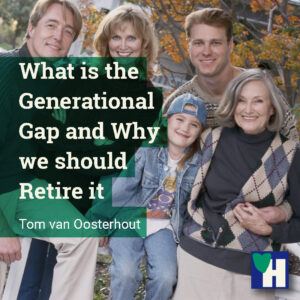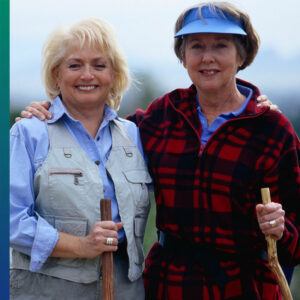
What is the generational gap? This gap emphasizes the differences between old and young. As a result, the ‘gap’ produces conflict and hampers communication. That is the big idea.
Generational differences feature often in the media. For the past 20 years, these differences also get closer attention in scientific research.
Moreover, discussing the generational gap is highly relevant because the current pandemic is suspected to widen the gap.
However, what is the generational gap? The answer, emerging in this article, is conclusive: the gap is an idea fixe and only causes prejudices.
Some of the links are affiliate links. As an affiliate associate, we earn a commission when you purchase any of the products offered through the shared links at no extra cost for you. This helps us maintain this website.
Table of contents

A generation consists of people of somewhat the same age, and with similar ideas and values. Participants of a generation are supposed to share the same identity. When the new and the old ideas are compared, the generational gap emerges. Without the generational gap, it is assumed that we could not understand social change.
The differences between generations are assumed to be important for societal progress. Each generation advances new ideas and innovations, replacing old ones. As a result, new generations produce social flexibility and provide new perspectives.
Scientists argue these changes are possible without changing cultural traditions and people’s identity. But what are the social changes, when there are no cultural and identity changes? Besides, what is the generational gap without any clues?
The cyclical pattern of generations
There is a theory which states that approximately every 20 years a new generation rises. Each generation goes through the same cyclical pattern. This pattern repeats itself roughly every 80 years.
The idea is that each generation goes through four personality types: idealist, reactive, civic, and adaptive. Each type of generational personality lasts 20 years. Every new personality in the cycle of generations is a reaction to the prior personality. Only significant historical events can frustrate this cycle.
The 80-year cycle proceeds as follows. The first personality, the idealists, is a narcissistic generation. This first generation’s personality raises the second personality type: indiscreet, alienated, and reactive kids. These kids, when they grow up, raise society-minded civics, the third generation. This third generation produces the fourth, the adaptive generation, which has an ethos of personal sacrifice and closes the cycle.
The problem is that there is no evidence to prove this cyclical theory of generations. Nevertheless, the theory is widely accepted, with respect to the timing of the generations and the generational labels.
Life-course events

Members of the same generation share experiences through participation in defining events, at a given time in history. Given this definition, World War II has defined our parents. The economic downturn of 2008 and the current pandemic are assumed to define our children and grandchildren.
The most influential experiences of our defining historical events occur in young adulthood. These experiences are most often linked with the experiences of the other members of the family in which we mature. The sharing of these experiences affects how we pass through our life-course. The identity of our generation is shaped during the first 20 years of our life.
When we share our experiences with the members of our family, this includes our parents. They are supposed to belong to a different generation. Our education, cohabitation, perhaps our own children, our work, can have a serious impact on our lives. Moreover, when we grow older we’re confronted with new events, often from outside.
Current examples of outside events, with a tremendous impact, are climate change, the destruction of biodiversity and ecosystems, and the pandemic of course. However, all these events have a comparable impact on all members of all so-called generations.
Related: Does our Identity Change when we Age?
Generational labels
Hannie and I are labelled ‘baby boomers’. We’re both born between 1946 and 1964. After World War II the depleted population was quickly replenished with new kids. The birth control pill, which came publicly available in the 1960s, virtually ended the boom of babies.
We’re preceded by the ‘silent’ generation, our parents, and followed by ‘generation X’, our children. Next came the ‘millennials’, followed by the ‘generation Z’. The latter is supposed to be the current generation: our grandchildren.
The birth of these generational labels cannot be traced through history. Journalists, magazine editors, advertising executives, and the general public invented, confirmed, and spread these labels. No scientific evidence exists to substantiate any of these generational labels.
Moreover, all the existing labels originated in the United States. This somewhat contradicts the claim that shared events and experiences dictate a certain generation. Generations in other countries hardly share, or shared, the same defining events and experiences as the Americans.
We are, what we define we are
People always vary on a number of experiences and expectations. Young people mature and change differently. Citizens in different countries grow up in different ways and in different cultures. Where is the generational gap, when generations are that hard to pin down?

The whole concept of generations seems weak. Scientists construct the generations by applying the same properties to age groups. Many individuals feel that a specific generational label does not apply to them. Year of birth and shared historical events are less and less experienced as useful variables to distinguish people. If such a distinction is useful at all.
Take for example the adoption of hedonism as the leading individual mindset in the 1970s. Hedonism emphasizes that we’re all individuals. From the 1970s and onward, we were all supposed to have different and regularly changing needs and capacities. Overnight, these ideas were adopted by all generations. So much for individuality and differences between generations!
Moreover, we constantly interact with our social environment, and the natural and not so natural world we live in. These interactions transform us and determine who we are. As is so eloquently illustrated by the general adoption of hedonism. But also illustrated by the fact that major threats, such as climate change and the destruction of biodiversity, impact all of us. Moreover, these threats require all of us (all generations, if you prefer) to take serious action.
Related: Protect the 1.000.000 Million Endangered Species of the World.
There is no generational gap

Why do we talk about a generational gap when there is none? Why is the idea of a generational gap this popular? Where is the generational gap? What are the cues that encourage us to categorize?
Perhaps we inherited categorizing from our ancestors. Take for instance the Italian Cesare Lombroso (1835 – 1909). He thought it was possible to recognize someone’s criminal character from physical anomalies, and collected all kinds of examples of such anomalies to prove his point.
Other less provocative examples are Carl Linnaeus (1707 – 1778) and Dimitri Mendeleev (1834 – 1907). Linnaeus is called the father of modern taxonomy: “the scientific study of naming, defining and classifying groups of biological organisms based on shared characteristics.” Mendeleev designed the periodic table of elements. Both scientific innovations were huge steps forward.
Unfortunately, with the science of the generational gap, it is as with the science of Lombroso. It is pseudoscience. Let’s stop this pseudoscience, and concentrate on what we all have in common, what motivates us and enjoy everybody’s peculiarities.
Have you ever experienced a generational gap? And if so, why? Please respond in the comment box below.


I have friends from a younger generation and an older generation. I value their friendship and the diversity, and I think it makes me more open to ideas that are not of my personal generation. So really, the generation gap should be retired. We should all learn from those younger and older and enjoy everything around us. Have friends of all ages and values.
Hi Leahrae,
Thank you for your comment. You’re quite right. We all need friends of different ages and values.
We also appreciate the differences between our son and us, and between his children and us. Our son and his children have developed a youtube channel: Los Hermanos Construyen. Together they make videos while constructing Lego toys. Very funny and revealing.
Of course, this is the only way we can see our grandchildren at the moment. Which is sad. Fortunately, they compensate the distance somewhat when they phone us. Makes you feel appreciated. And this is what relations are about of course to feel appreciate and to be able to express your appreciation.
Thanks again for your comment. For now, stay safe and stay healthy.
Regards,
Tom
I think that no generation can be tagged and/or generalized, although there are of course certain factors that influence a generation, such as the time after WWII. My father was born in 1945 and my mother in 1946. Both were raised in poverty but reacted differently to it. As adults, my father loved to waste food. He threw away big amounts of leftovers that we could have used for another meal, and I believe that he did that because it subconsciously made him feel wealthy and economically stable, which he was in fact. My mother, on the other hand, despite having a good job and income, always scraped out all the food from the pots and pans and left no leftovers at all. Until this day she does that. I know that it is due to the way she was raised.
As for generational gaps, I guess that there may be a gap sometimes but that depends on each personality. Most men who chat me up are between 10 and 20 years younger than me, haha, which is a huge compliment for me of course 😉 but as for friends, I usually get on better with people who are older than me.
Hi Christine,
Be aware of men, they are not to be trusted. Not the young ones, nor the older ones.
My son once asked his friends on facebook what they preferred to raise, a boy or a girl. One of them answered: with a boy I only have to watch one man. With a girl, I have to watch all the men in the world. I don’t know. Hannie and I have only one son.
It’s good you brought up the issue of food. I have something on the stove I’ve to watch. … Turned it off. My son and his two little boys come to visit us for a week, so I made something extra.
Now you brought up your parents, in relation to the generation issue, do you know how they shaped you as a person? You’re not a throw-away kind of person to me. So that’s something your father failed to transfer. However, do you scrape pans and pots like your mother?
It’s a difficult question to answer don’t you think? How your parents influenced you? My parents both loved food. My mother’s parents had a bakery in the middle of town. My oldest brother, my sister, and I were raised in the bakery and the shop. As a consequence, when we walk through a village or a city, I can smell a bakery from miles away. There is also the never ending urge to go in and buy a bun or a bread or a piece of cake.
But that is not a very essential influence. Moreover, I have to continuously control the urge to overeat. That’s a quality I probably inherited from my father. He could never stop eating. And he ate all the leftovers as well. No food was ever wasted.
Most of the time I wasn’t very pleased with my parents. It must have been mutual. I was not so very nice when I was young. Most likely I underestimate what they did for me, and the influence they had on me. It will take me some effort to find that out.
Well, next week we don’t have to wear our face masks anymore outside. That’s also something.
For now, stat safe, stay healthy.
Regards,
Tom
My grandmother puts this very well when people tend to complain about their kids. “Kids these days” is an expression used even when she was little. Yes, kids will always have different views, act somewhat outrageous, but we all have a lot to learn from one another.
Hi Riley,
Thank you for your comment.
You’re right, we can all learn from each other. No matter our age. Our children from us, and we from our children.
The thing with kids is, of course, that they have to arrange a life of their own. Sooner or later. The peculiar thing is that human parents don’t want their children to leave the house.
This is peculiar. Humans are the only animals who do not throw their children out of the nest. We’ll never learn.
For now, stay safe, stay healthy.
Regards,
Tom
Hi Tom, Interesting article, it made me think. I have never thought about generational gaps. We are the baby boomers and a huge generation that now are in retirement or close to retirement. But I don’t know if I see the economic disaster coming through the USA if we still will receive our pension scheme.
I always have had many different friends of all ages, so I have never thought about this. Corona wasn’t necessary because it is lab-made and released accidentally or intentionally into our world. Young people have a well-working immune system and don’t need to worry, and certainly not to receive a “vaccination” that is yet not tested enough. But, well, it has a huge impact on them and their lives.
However, our parents have suffered from hunger and lack of products in their time, which has certainly impacted their characters. I know that my parents tried not to throw things away. As a Timmerman, my father could still use many things he collected in his house, and my mother prepared food from their own vegetable garden and fruits like berries, apples, and pears to juice or stored them in glasses in the cellar and the freezer. I have learned very much from my parents and grandparents, and I am happy to use what I have learned from them nowadays. Thank you for this excellent article; I still keep thinking about it. 🙂
Hi Sylvia,
Thank you again for your comment and compliments.
You’re right, writing about the generational gap made me also think about the influence my parents and grandparents have on me. How am I controlled by their habits and culture? It’s difficult however to get some grip on this.
My father was a public servant. He studied and at the same time fathered 3 children. But his study never paid off. He worked all his life at the same office and never made any career progress. In contrast, although I also worked as a public servant, I never stayed with the same employer for more than 6 years. Every new employer was a jump in my career. Until I reached the top of what was possible in my job.
Then I decided to start for myself. Even when I was self-employed, I changed my trade several times. I was a consultant, an interim manager, and a social researcher when I closed my paid career. So the difference with my dad is huge. But is this a generational thing? I think it was very much determined by the circumstances. His were totally different from mine.
So, live’s can appear different, but in practice, I guess life is predominantly determined by our circumstances. I hope my father was as happy with what he did, as I was and am with the things I did and do. He never shared his personal feelings. Perhaps that was a generational thing.
For now, stay safe, stay healthy.
Regards,
Tom